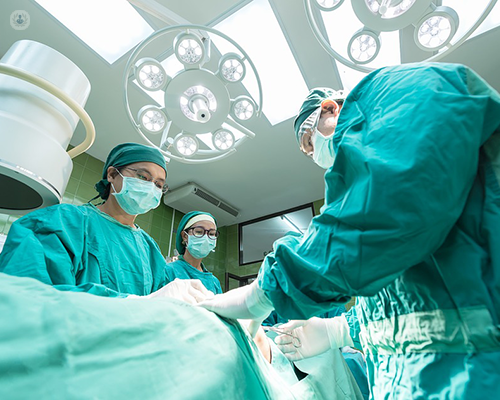Thyroid surgery: partial or total
Written by:The thyroid is an endocrine gland that is located primarily in the anterior neck, in front of the trachea, and whose main function is the production of thyroid hormone. Thyroid hormone helps in the regulation and stimulation of various functions in the body, including metabolism. The thyroid also manufactures thyrocalcitonin, a lesser-known hormone that is very important in the metabolism of phosphorus and calcium.

 What techniques are used for thyroid surgery?
What techniques are used for thyroid surgery?
The type of thyroid surgery depends on the extent of the condition: a partial thyroidectomy, where the left or right side of the gland is removed or, a total thyroidectomy where the whole gland is removed. In some cases, where there is benign pathology, it is not necessary to remove the whole thyroid and small fragments can be left, and it is called partial total thyroidectomy.
Additionally, there may be surgery in the general thyroid area, such as removal of the lymph nodes in what is called a cervical lymphadenectomy.
What are the most common complications in thyroid surgery?
There are essentially four most frequent complications in thyroid surgery:
1. Skin infection of the wound, although it is relatively rare since thyroid surgery is clean.
2. Bleeding can have important consequences since the cervical cavity has a limited blood volume. Excess bleeding can compress structures such as the trachea and cause the sensation of lack of air, in which case urgent intervention is necessary to drain the volume of blood.
3. Recurring nerve damage to the areas near the thyroid gland, such as the nerves that mobilize the vocal cords. It is important that they are not injured during a thyroidectomy
4. Lesions on the parathyroid glands that are very close to the thyroid gland which can cause an alteration in the metabolism of calcium.
How long does it take to get back to a normal life after surgery?
Thyroid surgery, in principle, does not require a great time of postoperative convalescence since it does not affect the digestive function or the respiratory or cardiac functions. The postoperative patient will start to tolerate liquid foods between 24, 48 or 72 hours maximum after surgery and the patient can return home to resume their normal lifestyle without complications or pain.
Is it necessary to take hormones after thyroid surgery?
The main function of the thyroid is the manufacture and secretion of the thyroid hormones necessary for multiple chemical reactions in the human body, so when the thyroid is removed in its entirety, it is necessary to replace these hormones by taking them orally on a daily basis. In the case that half of the thyroid is removed, in some patients, the remaining part can make up the deficit of hormonal secretion and there is no need to take thyroid hormones.


